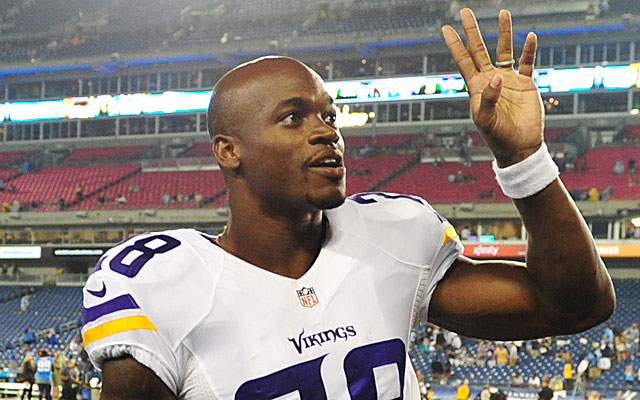
In a barbaric way, Ray Rice has been a unifying force. Domestic violence is abhorrent, a scourge on society, and the story of Ray Rice triggered a national conversation on the topic that saw all pockets of decent America -- man or woman, sports fan or not -- stand on the same side. The side opposite of Ray Rice.
But Adrian Peterson? That's another matter. While the story of Rice knocking out his fiancee in an elevator has produced moments of national clarity and unity, Peterson's form of domestic violence has produced no such accord. Peterson, the star running back for the Minnesota Vikings, has been investigated for one instance of abusing his child and indicted for another, though the abuse -- even the term "abuse" -- has not brought about moments of national clarity or unity.
That is another conversation we're having, a conversation that has extended far beyond the sports arena as people try to make sense of what Adrian Peterson did to discipline his 4-year-old -- Peterson told police he grabbed a tree branch, removed the leaves and whipped his son so many times he lost count -- and what it means not just for Adrian Peterson, but for us. Because some of our parents punished us with switches or belts. Some of us punish our children that way. Others spank, and were spanked, by hand.
Why do we hit our kids and where is the line? The Peterson case has opened up that conversation among NFL fans and non-fans and media, like this story about corporal punishment and Black America.
Here's a story that says what Adrian Peterson did with that stick wasn't "abuse" at all. Here's one that talks about corporal punishment and the long-term psychological damage it can do. Reggie Bush says he spanks his 1-year-old. What's right, and what's abuse? That's for you to discuss with your parents, your partner, your children.
Join the conversation. It's happening all over.
Real conversation Wednesday night between a father and his 16-year-old son.
Dad: Adrian Peterson was suspended today for hitting his 4-year-old with a stick.
Son: The f---?
Dad: Yeah. He called it discipline, but most folks are calling it abuse.
Son: Spanking's OK, but if you use a belt or paddle or anything else, that's too much.
Dad: I've got something to say about all of this.
Son: OK.
Dad: I spanked you when you were a kid. You know that. My dad spanked me. He told me, "Never spank out of anger," and I tried to do that. Well this week I've spent a lot of time on the Adrian Peterson story, and done some research into spanking, and all the studies -- I mean, all of them -- say spanking isn't some great form of discipline and actually can do emotional damage on the kid for the rest of his life.
Son: I don't feel damaged.
Dad: I don't think you are, but I just want you to hear these words from me: I shouldn't have spanked you. I didn't know what I was doing, and I was wrong. I'm sorry.
Son: Thanks.
The son in that story is mine.
By making such monstrous mistakes, by starting this important conversation, Adrian Peterson could do for the topic of corporal discipline what Michael Vick has done for animal abuse. To get there from here, Peterson will have to make like Mike and recognize just how wrong he was. Vick has said time and again that he was wrong to run that dog-fighting ring, wrong to train dogs to kill, wrong to kill dogs that didn't learn well enough. That's a lot to be wrong about, and for some folks it's too much to be forgiven. And if that's your stance on Michael Vick, well, that's a point well taken.
But for someone like Michael Vick to speak out against dog abuse and dog-fighting, to partner with the Humane Society -- to get for his children a pet dog -- that makes an impact. A rich and famous man rebuking himself thoroughly and publicly and repeatedly? Powerful message.
Now it's Adrian Peterson's turn. That's what his teammate of six years, former Vikings punter Chris Kluwe, told me would be the ideal direction for this rotten story to turn.
"It's good to see Adrian be able to focus on his family," is how Kluwe started when I called and asked his thoughts on the story. "We all lose football eventually, so it's far more important to know how to deal with your family than focusing on football so much that you don't know your way when you're done. It's important AP understands why what he did is bad, and how he can fix it, so that way not only can he fix things in his own life, but he can also serve as a role model to people who look up to him."
People think what Peterson did is fine, I tell Kluwe, because it's what their own parents did to them.
"Sure, you've seen the toothless commentary of people, 'Oh I got beat that bad as a kid, I turned out fine, it's not such a big deal.' Thing is, it is a big deal, because people look up to AP and they may honestly not know it's wrong," Kluwe said. "Just like Michael Vick got a second chance after he was rehabilitated and serves as a spokesman for animal abuse, that would come ideally for AP if he would first figure out, 'OK, why is this so harmful for people?' Then he could really make a difference."
Your thoughts on corporal punishment?
"In terms of giving a kid a quick swat on the backside, I swatted my daughter as I looked in her eyes. I was raised -- my parents were parents of the 1980s and so I got the belt occasionally. Never anything that left marks. Never left me bleeding or bruised. People need to understand, this isn't discipline when a child is bruised and bloodied. That's not discipline. That's beating a child. No matter your thoughts on corporal punishment, it's important to distinguish between that and child abuse."
Cris Carter seemed to be shouting, looked to be crying. The Hall of Fame receiver, now an analyst on ESPN, was talking about Adrian Peterson when he did what so many of us have done this week and shifted the conversation to his own upbringing.
"This goes across all racial lines, ethnicities, religious backgrounds," Carter said, starting slowly and calmly before finding his rhythm like the ordained minister he is. "People believe in disciplining their children. People with any type of Christian background, they really believe in disciplining their children. My mom did the best job she could do, raising seven kids by herself. But there are thousands of things that I have learned since then that my mom was wrong."
"Yes," Tom Jackson said. "Thank you."
"This is the 21st century," Carter said. "My mom was wrong. She did the best she could, but she was wrong about some of that stuff she taught me. And I promise my kids I won't teach that mess to them. You can't beat a kid to make them do what you want!"
"That's correct," Tom Jackson said. "Thank you."
"Thousands of things we have learned since then," Carter said. "And now we're to the point -- the only thing I'm proud about is the team that I played for, they did the right thing."
"Yes," Tom Jackson said.
"Take him off the field!" Carter was shouting now. "I don't care what -- we're in a climate right now, I don't care what it is. Take him off the daggone field, because you know what? As a man, that's the only thing we really respect. We don't respect no women, we don't respect no kids. The only thing Roger [Goodell] and them do -- take them off the field. Because they respect that."
Actual Christmas Eve turn of events:
The boy's on the floor, near the Christmas tree, refusing to come to the table for the big family dinner. The dad's calling him over, the grandparents are watching, and the boy just won't come. He's 6 or 7, and he almost always behaves better than he's behaving right now. The boy has been spanked for years, doesn't like it, will almost always back down when he feels a spanking is at hand.
This time, the boy doesn't back down. A couch is between the father and son, and the son is on the ground whining that he doesn't want to eat. He wants to open presents. The family tradition is to open them after Christmas Eve dinner, but the boy doesn't want to wait. This is unlike him. Maybe he's tired. For sure he's excited. Whatever he is, he's embarrassing his father.
And don't you ever embarrass me in front of my parents.
So here's what I did. That couch that was between me and my son? I scaled that thing like an angry dog. I didn't climb over it so much as I pounced over it, leaping and hurtling in one furious motion over the back side of the couch, over the cushions, onto the floor. Above my son, who is stunned silent and now on his back, his only reaction to the sight of his father, who outweighs him by at least 100 pounds, coming over the couch like a tidal wave and hovering overhead, intimidating the kid into submission.
My son started to cry, and not the whining cry we've heard as parents, not a cry for attention or sympathy. Not crying out of anger or exhaustion. He was crying from fear, and he was wailing, and it has been more than 10 years and I can still hear him cry.
Why did I come over that couch like a monster, instead of finding another way to discipline my kid? I don't know, but I was a spanker. Once you decide to handle things physically instead of verbally, what's the difference? I can spank that kid; he's mine. I can leap this couch and loom over him. I'm not being violent, per se, but the threat is implicit.
That kid's in college now, out of the house, but I apologized to him too. Called him this week, found him in his dorm room, opened the topic by asking for his take on the Adrian Peterson story.
"He shouldn't hit his kid with objects," my son said.
What about hitting his kid without objects?
"Depends on how hard."
No, it doesn't. This is what I told my older son, same as I told his younger brother: Spanking's wrong. I was wrong. And I'm sorry.
And here's what my kid told me:
"Thank you Dad. We've been talking about [Adrian Peterson and discipline] a lot up here, and I had this weird thought pop into my head: That it was very, very degrading to be spanked by you. I felt shame."
Degrading? Shame?
"Yeah. I went back to that time and remember thinking, 'How dare he? Who gives him the right.' But it was a random thought, and I don't know where it came from, and it passed."
This is me, feeling 6 inches tall. This is me, wanting to go back in time, wanting another chance at being a dad to young children, one who wouldn't even think about using his size and strength to physically punish them.
This is me, disappointed in myself and horrified at Adrian Peterson but happy to be part of this conversation with my own sons. This is me, talking to young and future fathers. This is me, hoping you're listening.





















